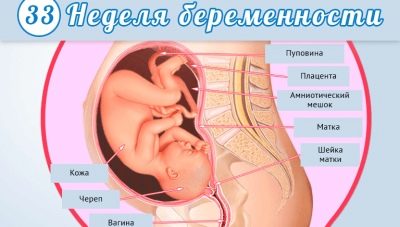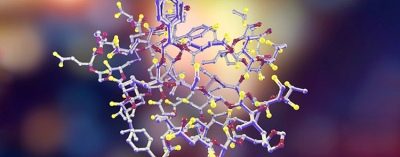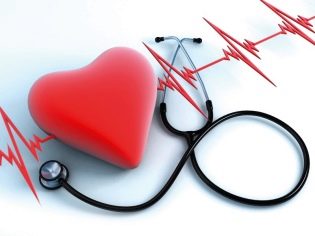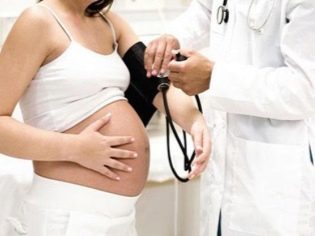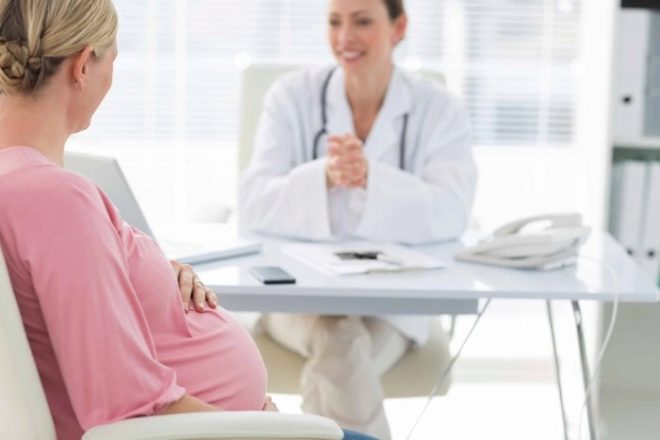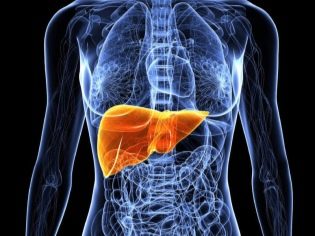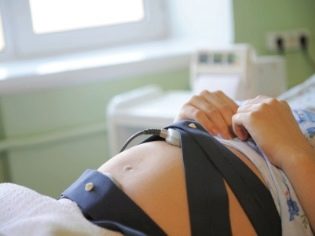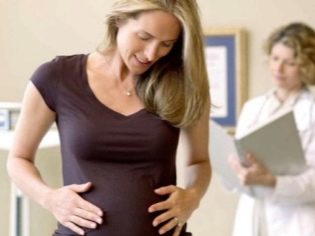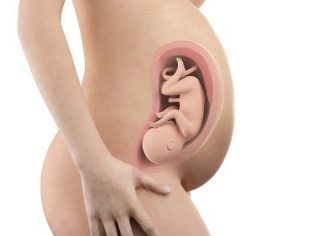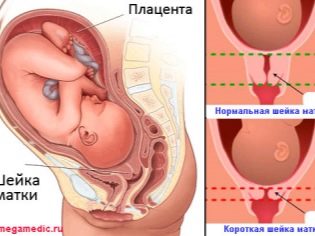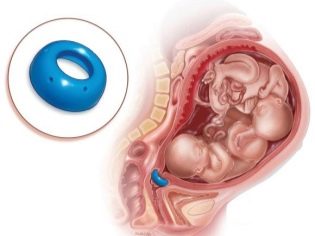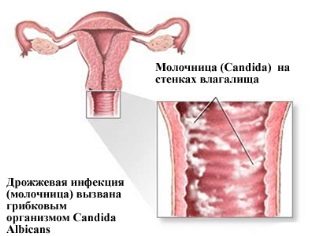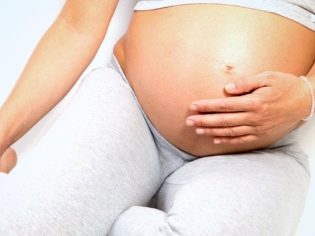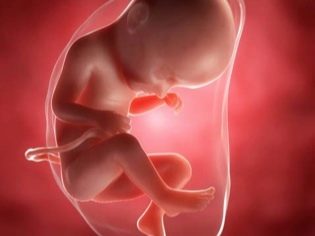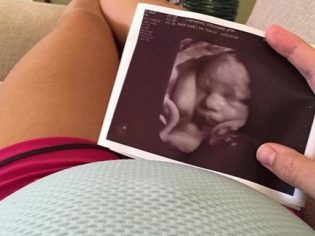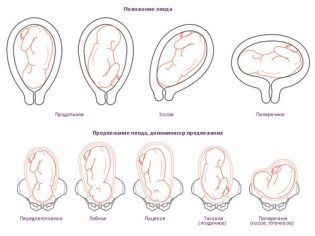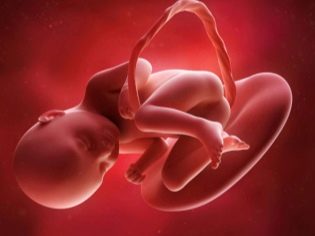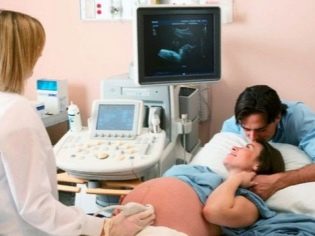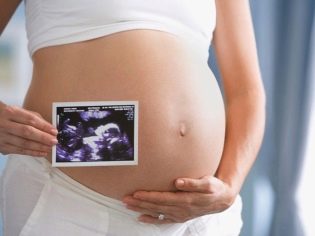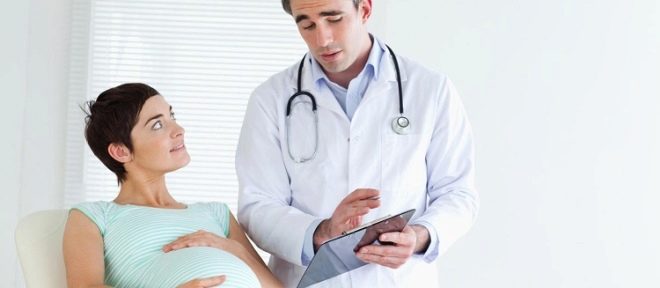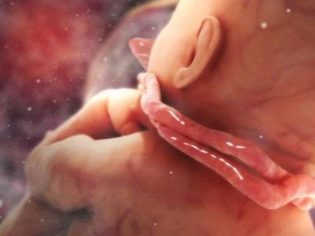What happens to the fetus and the expectant mother in the 33rd week of pregnancy?
During pregnancy, many changes occur with both the mother and her baby. At each term they are different.
How many months is it
33 weeks are full the eighth obstetric month and one more week. Also, this period corresponds to the age of the fetus, equal to 31 weeks from conception.
This feature is due to the fact that midwives use a different counting system: in medical practice, the term “obstetric week” is used when the age of the fetus is calculated from the date of the first day of the last menstruation of the woman. They are used by doctors of various specialties.
Features of the pregnant woman
At 32-33 weeks of pregnancy, the female body begins to gradually prepare for childbirth. Every day a woman's hormones change, which contributes to the altered work of her internal organs. Such changes are necessary so that the baby can be born on time.
Physiological changes
At the 33rd week of pregnancy, women also begin to experience many functional changes, the main of which occur in the hormonal background. This is largely due to the fact that the female body begins to actively prepare for the upcoming labor and the next stage of lactation.
Prolactin begins to appear in the blood of a pregnant woman. This hormone has an effect on the ligamentous and muscular apparatus of the pelvis. Muscle elasticity increases. Such changes are necessary so that, during his birth, the baby does not have significant damage.
An increase in blood concentration of prolactin levels contributes to the appearance of characteristic changes in the mammary glands. Chest hurts and increases in volume. This kind of preparation of the female body is necessary for the next stage to begin after the baby is born - lactation.
At this stage of pregnancy a woman may form colostrum. This special nutrient fluid, which is necessary for feeding the child for the first time after his birth. The chemical composition of colostrum is variable. It varies with the physiology of the baby. First, colostrum is thicker. Then its consistency changes, and it becomes more fluid.
When conducting a mandatory consultation of future mothers obstetricians and gynecologists must determine their weight gain. This research method is fairly simple, but informative. He helps the doctor to assess the general state of the work of the organism of the future mother. Also, by indirect evidence, the doctor assesses the growth rate of the baby in the womb.
Doctors recommend to closely monitor the weight gain during pregnancy. They record the obtained figures in a medical card, which further helps them to assess the dynamics of the course of a particular pregnancy.
The overall weight gain in women can be different - it depends on various factors, including the presence of chronic diseases of internal organs in the future mother. From the beginning of pregnancy to 33 weeks, a woman’s weight can increase by 10-13 kilograms.
This clinical indicator can be considered only indicative: if the increase in weight is slightly less or more than the established norms, then the expectant mother should not panic. Much more important is a comprehensive assessment of her health status, as well as the intensity of the development of the baby. For this, doctors use other auxiliary research methods.
Sensations
33 week of pregnancy is a time when a woman already strongly feels her child inside. A real emotional and physical connection is already developing between mother and child to this stage.
Many women note that at this stage of pregnancy they felt strong changes in their habitual behavior, as well as numerous sensations in their body. Such a variety of symptoms arising is conceived by nature. This is necessary in order for the female body to acquire a new quality - motherhood.
About the nervous system and psyche
At this period of pregnancy, the expectant mother is much worse endured psycho-emotional effects. This leads to the fact that the woman becomes more difficult to cope with stress.
Mental activity of the brain at this time is already aimed at preparing for the upcoming birth. Reviews of many women indicate that at this stage of pregnancy, it became quite difficult for them to cope with a large amount of information.
Also for this period is characterized by a decrease in memory and distraction of attention. It becomes very difficult for a woman to concentrate on performing many actions at once simultaneously. Strenuous mental activity can lead to rather rapid exhaustion, and the expectant mother will feel the need for more rest.
Strong tension can lead to spasm of the blood vessels of the brain. In this case, the expectant mother may feel that she is dizzy. Usually this unpleasant symptom completely disappears after resting or in a horizontal position.
The changing hormonal background contributes to the fact that many pregnant women have daytime sleepiness. Every day this symptom may progress. At night, the opposite situation occurs most often - difficulty falling asleep. Many women complain of insomnia. As a rule, this symptom is more pronounced in expectant mothers who have a tendency to increased anxiety and suspiciousness.
At this stage of pregnancy, many women begin to experience mood swings. Many of them are similar to those that occurred in the first trimester.
Such changes occurring in the woman’s nervous system at this time are largely due to the preparation for the upcoming birth. So, the expectant mother begins to worry more often, “to break” over trifles. She has increased anxiety and excitement.
Some women may develop a reverse symptom - some apathy. From the side they look slower, more often they are silent. Such changes should not be taken for some kind of pathology. After the birth of the child, the hormonal background of the woman will change, and all the symptoms that have occurred will gradually normalize.
About the cardiovascular system
During this gestational period, blood flow indicators in the great blood vessels are very important. Through them, the baby receives all the necessary components necessary for growth and development. The blood flow in a woman should also be sufficient to ensure the increased need of the internal organs of her own body during pregnancy.
Evaluate the performance of the cardiovascular system in the future mother can be using different methods. One of the simplest studies is a routine clinical examination, which is conducted by a therapist. During the consultation, the doctor necessarily counts the pulse and measures blood pressure.
Deviations from the norm must be evaluated by a specialist. It often happens that the first manifestations of pathologies occur in women during pregnancy, because at this time the female body is experiencing the maximum load.
An important indicator of the cardiovascular system is blood pressure. It can be measured both at home and when visiting a doctor.
Some women at this stage of pregnancy may experience an increase in blood pressure - a condition called hypertension.
To normalize the pressure the doctor makes a set of recommendations, which includes a lot of different points. If it is impossible to achieve normalization of blood pressure only with the help of recommendations for changing the mode of the day, medications can be prescribed.
In the treatment of pregnant women often used drug "Dopegit». Taking this medication helps to achieve normal blood pressure values. Independently take antihypertensive drugs without the advice of a doctor can not. This may entail quite dangerous consequences not only for the expectant mother, but also for her baby.
About the gastrointestinal tract
At this stage of pregnancy, women begin to experience specific changes in the work of the digestive system. So, the acidity of the gastric juice begins to increase. This leads to the fact that expectant mothers have heartburn. Most often this symptom manifests itself in the evening. Progression of heartburn also contribute to errors in nutrition.
Women with chronic gastritis or other diseases of the gastrointestinal tract are at increased risk for the development of adverse symptoms. Increased acidity leads to the fact that a woman has a stomachache.
Disruption in the gastrointestinal tract contributes to a woman may experience stool disorders. A common symptom that future moms complain about is constipation. In some women, the general condition is also aggravated by the development of hemorrhoids. Errors in nutrition in this case only increase the severity of adverse symptoms.
It is very important that a pregnant woman receive all the components important for her health and her baby in her daily nutrition. To normalize the intestinal microflora requires a sufficient amount of fiber. It is found in large quantities in various fruits and vegetables. Inclusion in the diet of plant foods will help the expectant mother to cope with constipation.
In case of the appearance of hemorrhoids, the woman must consult with her doctor. In some cases, it is necessary to select special ointments and suppositories (rectal suppositories) necessary to improve the condition.
Such drugs are selected strictly individually, taking into account the initial state of the woman. As a treatment, only those products that do not have a negative effect on the fetus can be used.
In some cases, there may be another situation - diarrhea will appear. If loose stools are accompanied by fever, increased abdominal pain, and vomiting, this may be due to an intestinal infection or food poisoning. In this case, to delay the treatment of doctors should not be. This condition can be dangerous for both mother and her baby.
The increasing load on the organs of the gastrointestinal tract leads to the fact that the organs of the gastrointestinal tract begin to work intensively. Characteristic changes can occur in the liver. The intensive work of the body leads to the fact that it begins to produce a large number of biologically active substances. This may lead to the fact that the level of AST and ALT in the blood of the expectant mother will be increased.
Abuse of fat and fried foods also leads to an increased load on the liver.Women who like to eat fast food during pregnancy are more likely to have problems in the gallbladder. It is especially dangerous to have such products for expectant mothers who have chronic cholecystitis..
To normalize the state of the female body in such a situation, the doctor will recommend a woman to follow a diet. In some cases, this measure is not enough, you may need medication.
They are discharged strictly to the physician for medical reasons. One of these means is “Ursosan". The expectant mother should definitely discuss the reception of this drug with her therapist.
Other changes
By this period, a woman’s carrying a baby already has a very large belly. This is due to the relatively large size of the baby at this stage of its development.
Increasing in size the uterus begins to rise. This leads to the fact that the pressure in the abdominal cavity gradually changes, which contribute to the appearance of a feeling of heaviness in the abdomen and in the lower part of the chest.
A woman may feel that she is breathing heavily or not having enough air. Most often, such changes are most pronounced after a quick walk.
Also common clinical sign that appears at this stage of pregnancy is the presence of pain in the spine. Women often complain to their doctors that they are pulling the lower back strongly or their back hurts. The severity of these symptoms may be different. This is largely influenced by the initial state of the muscular system in the future mother. The “stronger” the muscular framework, the less this feature appears.
In some cases, women may complain about the appearance of pain in the pubic bone, as well as at the bottom of the pelvis. These symptoms are usually transient. After performing intense physical exertion, they can increase. In this case, it is very important to immediately consult with your doctor.
At 32-33 weeks of pregnancy, women may experience cramping contractions of the walls of the uterus. Such changes are called training bouts.
Most often they are detected during cardiotocography. However, such changes future mother can feel. They manifest themselves as rather short and moderate reductions in the lower abdomen.
Panicking a woman when this symptom appears is not worth it. This is quite a physiological reaction that can occur at this stage of pregnancy. The appearance of any cramping sensations in the lower abdomen is a significant reason for contacting your doctor.
The doctor should assess how close the delivery is. To do this, he necessarily evaluates the disclosure of the cervix. Only after conducting a clinical examination, the doctor will be able to establish how quickly a baby’s birth can occur.
Many women experience discomfort due to the development of edema. They can appear not only due to pathological changes. At this stage of childbearing, swelling on the legs appears even in expectant mothers who have never had problems with puffiness.
The increasing uterus puts a lot of pressure on the organs nearby. The kidneys and urinary organs are quite severely compressed. This contributes to the violation of the outflow of urine and the appearance of puffiness.
Swelling can occur both on the legs and on other parts of the body. Quite often, swelling appears on the face. Pregnant women suffering from increased edema also change the contours of the face, its oval becomes more round. The eyelids swell and can hang heavily. Usually the severity of edema is most pronounced in the morning.
About sex life
The question of sexuality becomes very relevant for both women and men. Many couples are afraid to inflict any damage to the baby and consciously limit sex.Not all situations require compliance with such a "restrictive" mode.
During sex at this stage of pregnancy it is very important for the couple to monitor the intensity and depth of penetration. In all, it is important to observe moderation. It is better to choose the most comfortable postures for a woman.
With a complicated version of the development of pregnancy, the doctor may recommend the expectant mother to limit the conduct of sexual life. Such recommendations are always made individually.
In order to assess the possibility of having sex and the potential risk to the fetus, the doctor must necessarily know the features of the initial state of both the woman and her baby.
Some women may experience some sexual changes during this period of pregnancy. So, they may not feel bright and emotional impressions after having sex. Achieving orgasm can also vary. Such changes are caused by altered hormones.
Possible reasons for concern
Even with a healthy pregnancy, expectant mothers may experience various changes. Quite often they become a cause for worry and anxiety. Many of these conditions are very characteristic for this gestational age.
Dental problems
In this period of pregnancy, quite often there are various pathologies in the oral cavity. Such changes are also preceded by varying hormones. So the changed concentration of estrogen in the bloodstream contributes to the fact that a woman may increase bleeding gums. This condition is dangerous in that the expectant mother may develop adverse symptoms of periodontal disease.
In order to somewhat reduce the intensity of these clinical manifestations, the expectant mother should use special mouth rinses and gentle toothpastes. The best choice - products made from natural herbal extracts.
As an adjunct to treatment, gargles with chamomile or sage flowers cooked at home are also excellent. If a woman has an individual intolerance to any herbs, she should choose the means that do not lead to the development of her allergies.
To help in the choice of complex means for the oral cavity can a dentist. If a pregnant woman has a toothache, she should immediately see a doctor. Panic is not worth it.
Many modern tools used in dental practice now are safe for pregnant women. It is better to treat teeth during pregnancy with specialists with sufficient clinical experience of such work.
Reduced immunity
During pregnancy, the immunity of women is somewhat reduced. This natural feature is necessary so that the mother’s immune system does not reject the child as an alien genetic object.
Specific changes in the immune system of a pregnant woman contribute to the fact that her body becomes very vulnerable to the penetration of any infection into it. Both viruses and bacteria can cause diseases. Also, the future mother at this stage of pregnancy is quite high risk of a cold. Acute respiratory diseases are accompanied by the development of numerous adverse symptoms. A woman may develop a runny nose, nasal congestion, and nasal breathing is also difficult.
Quite often, the infection "goes down" into the oropharynx. This can cause a woman to develop symptoms of pharyngitis. A future mother should always be aware of the high risk of a cold at this stage of pregnancy, and therefore take care of herself. A cold can be dangerous by the development of complications both for the woman herself and for the baby who “lives” in her stomach.
The weakening of the immune system contributes to the fact that a woman may have herpes on her lips.In some cases, for the appearance of lesions on the mucous lips and local hypothermia.
The severity of symptoms may be different. In some cases, herpes infection is quite difficult. In such a situation, consultation of the doctor is required. As a rule, doctors try to limit therapy only to prescribing drugs that have a local effect.
Female genital pathologies
Assessment of the reproductive organs of the pregnant woman is very important. Only dynamic observation allows physicians to detect dangerous conditions and emerging pathologies in a timely manner.
There are many different pathological conditions associated with shortening of the cervix. Its short length increases the risk of preterm delivery.
A shortened uterus can cause the development of cervical insufficiency. This pathology is dangerous in that the baby can be born much earlier than the prescribed period of its birth.
For the treatment of this pathological condition obstetrician-gynecologists use various techniques. A treatment regimen is drawn up individually for each patient. In some cases, the method of hormonal treatment. To do this, doctors prescribe drugs that affect the concentration in the blood of female sex hormones. This treatment also has an effect on the cervix.
One of the drugs used for hormone therapy is "Utrozhestan." Selection of dosage and treatment regimen is carried out individually.
Also taking this drug must be supplemented by regular consultations with a doctor. Only in this way can the doctor monitor the effectiveness of the chosen therapy.
For the treatment of cervical insufficiency caused by shortening of the cervix, doctors can also use special obstetric devices. They are called pessaries.
The use of such products helps to significantly reduce the potential risk of having a baby ahead of time. It is important to remember that there are certain medical conditions for installing a pessary. If a woman has any acute pathology of the external genital organs, this can be a contraindication for its use.
Also during the baby's birth, the doctors evaluate other clinical parameters. The tone of the uterus is a rather important indicator of the state of the intimate organs of a woman. Its significant increase can lead to the development of dangerous states for the fetus.
At this stage of pregnancy, a woman should carefully monitor what discharges she has from the vagina. Normally, they should be light. There should be no sour or offensive smell.
If the expectant mother has noticed that the vaginal discharge has become bloody or has acquired a purple color, she should immediately see her physician. At this stage of pregnancy, this symptom may be due to dangerous conditions for the baby.
In such a situation, the doctor will conduct a gynecological examination on the chair, during which he will be able to determine the cause of the changes. If necessary, he will direct the future mother to undergo ultrasound. It is also very important to immediately see a doctor if a woman feels that her ovaries are sore.
The reduced work of the immune system against the background of an altered hormonal background may lead to the woman having symptoms of thrush. Permissible errors in nutrition can also provoke the growth of candidal flora. Excessive love for sweets and chocolate can increase the adverse symptoms of thrush.
With candidiasis of the genital tract, a woman appears quite a lot of changes in the body, bringing her discomfort. One of these clinical signs is vaginal itching. A woman may also feel that she has a sore crotch.The severity of itching in the intimate area may be different, with a strong degree, it significantly violates their usual way of life.
Another characteristic sign of candidiasis is the appearance of specific white secretions. According to their consistency, they resemble cottage cheese. The occurrence of these adverse symptoms is an important reason to consult a doctor.
32-33 week of pregnancy - this is the time when a woman has a mucus plug from the genital tract. In this case, it is very important to immediately seek medical attention.
Many women start panicking on stopping. Do not do this. It is important to understand that only a doctor can assess the approach of labor.
In medical practice, there are cases when a lot of time passes between the initial discharge of the mucus plug from the genital tract and the birth of a child. The need for hospitalization of a woman in a hospital in such a situation is determined by the doctor, who conducts a clinical examination.
The leakage of amniotic fluid at this stage of pregnancy is also a symptom requiring the urgent treatment of the expectant mother to the doctor. In this case, it is necessary to assess how strongly the cervix is revealed.
In some cases, the woman will need an urgent delivery. This is usually done if there is a high risk to the life of the fetus. Obstetricians point out that there are quite a lot of babies born at 33 weeks gestation.
Features of the fetus
This period of intrauterine development is characterized by the development of specific changes in the baby. The child in this period of its development is already quite developed.
It is important to remember that many features can be physiological and not a pathology. So, on the features of the constitution of children have a strong influence on the parameters of his parents. When assessing fetal development, the doctor will necessarily take into account these features.
It is important to remember that in order to identify the pathology of the child at this time, it is necessary to conduct a lot of different research methods.
Only with the help of a few diagnostic examinations can any abnormalities and abnormalities in the prenatal development of the baby be identified.
Development on this term
In order to determine the main criteria for intrauterine development of the baby at this stage, doctors use special clinical signs. One of them are the anatomical features of the fetus:
- At this stage of pregnancy baby weight already reaches 2000-2100 grams. The growth of the baby in this case is approximately 43-44 cm. It is important to remember that these parameters are indicative. In women who carry several babies at once at the same time in one pregnancy, babies can develop differently. It often happens that one child develops somewhat more intensively than another. This may be manifested by the fact that the size of his body will be larger.
- Head circumference A baby at this stage of its prenatal development is about 29-33.3 cm. When performing an examination, you can also measure the parameters of other anatomical structures. Thus, the circumference of the child’s tummy at this stage is approximately 26.8-32.5 cm.
- With an ultrasound, the doctor can also determine sizes of some bones. So, the length of the hips of the baby at this time of its development is 5.8-6.8 cm, hangers - 5.5-6.3 cm.
Physiological changes
At this period of its prenatal development, the baby leads an already quite active intrauterine life. If there is a sufficient amount of amniotic fluid in my mother's tummy, the baby is comfortable to move. The activity of the baby is felt by the woman herself, she can also be detected during the ultrasound examination.
At this stage of fetal development, the baby begins to experience changes in the configuration of the body. Gradually accumulates adipose tissue.This is necessary so that the baby after his birth was adapted to life in a new habitat.
Adipose tissue has a thermostatic function. It is precisely because of the necessary amount of fat depots that the child does not overcool immediately after his birth. Premature babies who were born before the due time often have problems with heat regulation.
The position of the baby in the womb is also very important. As a rule, in this period of pregnancy, the baby already assumes the correct position. In this case, his head is at the bottom, towards the genital tract.
Such an arrangement is the most functionally beneficial. In this case, the movement of the baby through the birth canal during birth is physiological.
The position of the baby in the uterus is an important evaluative indicator for determining the tactics of labor. Pelvic presentation of the baby is physiologically disadvantageous. This condition requires a more attentive approach from doctors.
In addition to the anatomy of the baby, the doctor necessarily takes into account the features of other children's organs. A very important formation is the placental tissue. The value of the placenta can not be overestimated. This organ is a direct participant in the circulatory system between mother and baby.
In the placenta pass the blood vessels through which the baby's body is provided with all the necessary components necessary for its full growth and development.
In order to determine the pathology of the placental blood flow, doctors use Doppler. For each term of pregnancy there are certain norms. Their use allows doctors to identify various pathologies in a timely manner. With the help of a doppler, the doctor can evaluate the effectiveness of blood flow through the placental blood vessels.
Baby in the period of its prenatal development is in the aquatic environment. This is ensured by the presence of amniotic fluid in the uterus. In order for the child to fully grow and develop, you need a sufficient amount.
Reduced amniotic fluid can lead to the development of dangerous states for the fetus. The amount of amniotic fluid is necessarily evaluated during the ultrasound examination.
If this indicator is significantly reduced, the obligatory consultation of an obstetrician-gynecologist is required. The doctor must evaluate the state of health of the baby.
What could be the pathology of the baby?
During their prenatal development, the child receives nutritional components from his mother through the umbilical cord. There are blood vessels in the composition of this unique organ of pregnancy.
The umbilical cord can be of different lengths, which is determined by many factors. Severe shortening of the umbilical cord can be very dangerous for the fetus: it is much more difficult for the baby to move along the sexual ways during natural childbirth. In this situation, as a rule, doctors resort to caesarean section.
Too long umbilical cord can also cause various violations in the baby. One of these conditions is a single cord entanglement around the baby’s neck.
In this case, it is very important to assess: does this condition lead to the development of a hypoxic state in a baby? During hypoxia, oxygen saturation of the internal organs decreases. To assess the severity of the resulting violations, the doctor must evaluate the condition of the child in his mother's tummy.
At weeks 32-33, the baby can change its position in the uterus, which will lead to its "unraveling" from the umbilical loops surrounding its neck. It is important that the amniotic fluid is sufficient for this.
If the umbilical cord too tightly covers the baby’s neck and leads to pronounced disturbances in his general well-being, it is necessary to consider the issue of carrying out urgent deliveries.
Recommendations
The final period of pregnancy is very important.This time is necessary for the future mother in order for her body to fully prepare for the upcoming birth. The more qualitatively a woman will monitor her health and state of mind, the calmer the birth will be.
What is worth doing?
It is better to make the choice of a medical institution in which the childbirth will take place in the future. This will help a woman to significantly reduce anxiety before the upcoming birth of a child. It is also very important for the expectant mother to trust the specialists and doctors who will give birth to her.
Things to travel to the hospital is also better to prepare in advance. It is not always the case that childbirth comes at a strictly fixed time. If the future mother has already collected a bag with everything necessary for hospitalization in the hospital, she will be much calmer. It also reduces the risk that at a crucial moment a woman simply forgets something.
The future mother should think about what things she will need at the maternity hospital. Choose comfortable and comfortable to wear things. It is better that they are made from quality materials with a lower content of synthetics. Also, do not forget about comfortable shoes.
In different maternity hospitals the list of necessary things can be different. It is better to know what is required in advance. Such training will help the expectant mother to remain calm just before the birth.
It is very important that in the later periods of childbearing the expectant mother watched her nutrition. Some women at this time can eat a lot of food. Thus, they simply “seize” the impending stress before childbirth.
Some women, on the contrary, completely lose their appetite. Such extremes of feeding behavior are not physiological for either mother or her baby. It is important to remember that during the entire period of pregnancy you need to eat right. This is necessary so that the prenatal development of the child proceeds optimally.
In the daily menu of the future mother must be present a variety of proteins, fats and carbohydrates. Also daily a pregnant woman should receive vital vitamins and trace elements.
In late pregnancy, it is very important for women to control the amount of salt they consume. Excessive amount of it in the diet will lead to edema.
A lot of sodium chloride is found in ready-made semi-finished products, salted and smoked fish, as well as in chips and crackers. These foods should be excluded.
For excellent health at this stage of pregnancy is very important drinking mode. It is better to fill the loss of fluid in the body with ordinary water. You can diversify your drinking regime with the help of fruit and berry compotes and fruit drinks.
The state of the nervous system of the future mother at this time is very important. Positive emotions will help a woman to feel more relaxed, and also contribute to the fact that she will be less nervous and worried before the upcoming birth.
You can balance the general mental state with the help of special breathing exercises. If the expectant mother feels that it is difficult for her to cope with the mood swings she is experiencing, then she should turn to a psychologist for help.
To maintain good health, a pregnant woman should take regular walks in the fresh air. Such a promenade will help improve systemic blood flow in the blood vessels. This will help reduce the likelihood of hypoxic changes in the fetus.
What can not be done?
In order for the pregnancy to end safely, the expectant mother should carefully monitor their health. Many of the usual activities while doing this should not be. For example, expectant mothers do not need to lift weights. Such static loads will increase pain in the lower back.
Many women often have a question about is it possible to dye hair during pregnancy. Unified recommendations from doctors about this is not found. Someone from the experts does not recommend dyeing hair during pregnancy and lactation, while others do not see anything wrong with that.
Highlighting and dyeing hair is best done with the help of more gentle dyes. In this case, the risk of exposure to chemicals on the body is somewhat reduced. To decide whether to dye your hair or not, a pregnant woman should independently.
About what happens to the fetus and the expectant mother in the 33rd week of pregnancy, see the following video.

